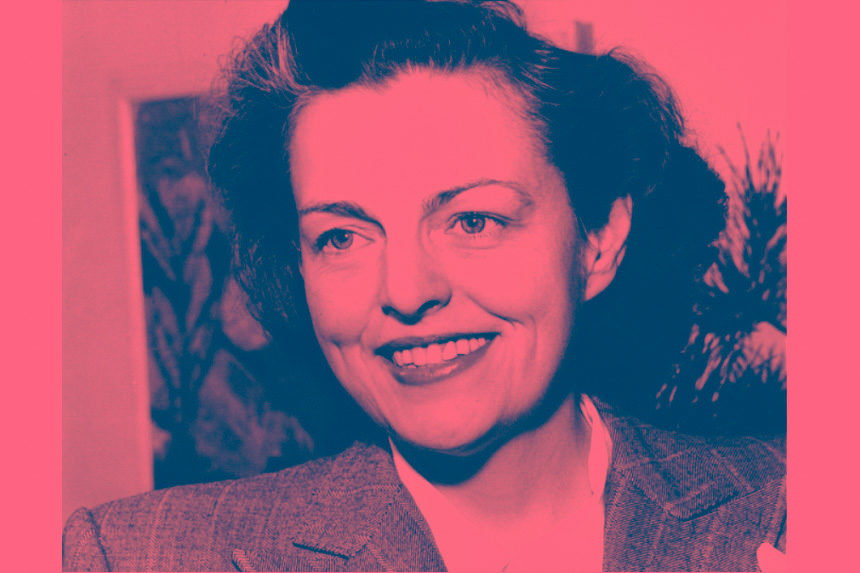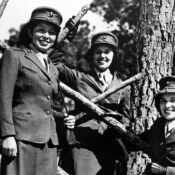When actress Helen Gahagan Douglas returned to Broadway in 1952 to star in a revival of the play First Lady, the Times called the phenomenon a “rare case of type-casting,” claiming that Douglas’s experience in Washington had uniquely prepared her for the role. A more accurate case of type-casting, however, might have seen the former congresswoman starring as the Commander in Chief, since that seems to be the role Douglas’s years in Washington more closely resembled.
“Helen was the first woman in America,” Sally Denton wrote in the biography The Pink Lady: The Many Lives of Helen Gahagan Douglas, “who had the capacity, the credentials, the ambition, and the political gravity to realistically aspire to the highest office in the land.”
Sandwiched between her performing years, Douglas served three terms as a California representative, outspoken in her defenses of New Deal-style policies, migrant worker welfare, and nuclear de-escalation. During an ambitious run for Senate in the nascent years of the Cold War, the controversial stateswoman’s Democratic allies abandoned Douglas, dooming her political career and propelling that of her opponent: Richard Nixon.
Though many other women had taken part in national politics, Douglas’s tenure forged a style of public service for unflinching, outspoken female policymakers — decades before feminism would become a mainstream label — by confidently centering issues that still garner national discussion.
Her path to public service was paved with the glitz and glamor of show business. The young Douglas was early deemed a rare beauty destined for fame, to her father’s chagrin. After college, she starred on Broadway, sang in tours around the world, married an actor, and settled down in Hollywood. “From my childhood I’d been led to believe that it was such a nice world,” she told the Times. “Such a nice world that you just wanted to sing. But when I saw something of the other side of things, I reacted to that.”
The “other side of things” included the rise of Nazism — which Douglas witnessed on a trip to Austria and even in Tinseltown itself — as well as the plight of the desperate farmers who poured into California during the Dust Bowl. Her husband, Melvyn Douglas, cofounded the Hollywood Anti-Nazi League, and Douglas slowly drifted from her Republican roots into the echelons of the California Democratic Party. Under the personal guidance of Eleanor Roosevelt, she came to head the state party’s Women’s Division as well as the John Steinbeck Committee to Aid Agricultural Organization, a group that sought to secure collective bargaining rights for farm workers after the publication of The Grapes of Wrath shone national light on their destitute circumstances.
Douglas’s contemporaries agreed that she had a knack for condensing intricate political issues into logical, compelling rhetoric, but she was known to belabor her arguments. In politics, she had found a uniquely exciting discipline into which she could throw her passions. As she wrote in her memoir, acting and singing drew a crowd’s attention to her appearance and talent, but political performance was all about shining the spotlight on critical human issues outside herself. “After a campaign speech the embarrassing preoccupation with me didn’t happen,” she wrote. “Talk afterwards was about the issues I had raised; people were drawn to me because they wanted to discuss matters of enormous importance.” In her career, Douglas would be constantly steering focus back to the issues, even as her opponents and the press sought to drag her back into the limelight.
A path to the White House would certainly have been narrow for Douglas, but it wasn’t considered an impossibility by Democratic insiders as she ascended the party’s ranks in the 1940s. When Douglas spoke at the Democratic National Convention in 1944 (“The Democratic party is the true conservative party. We have conserved hope and ambition in the hearts of our people”) she stole the show, sparking talk of an inevitable vice presidential nomination, if not a run for president.
As the representative of California’s diverse 14th district, Douglas used her seat as a sort of national platform to call attention to labor issues, civil rights, progressive taxation, affordable housing, and — most consequentially — the stark omen of nuclear proliferation. In rousing orations, on the House floor and elsewhere, she channeled her masterful dramatic energies into arguments for left-liberal policy. In a celebrated speech given on the House floor in March of 1946 (“My Democratic Credo”), Douglas argued that the best defense against communism in the U.S. — rather than a massive witch hunt — was the rigorous safeguarding of public institutions from the influence of “big business”: “Democracy cannot long survive when the people permit their lives to be dominated — economically or politically — by a powerful few.”
Though a mainstream national movement for civil rights was years away, Douglas’s substantial Black constituency compelled her to take some comparatively bold positions. She was the first white representative in the country to staff African-American aides, and she sponsored a (doomed) anti-lynching bill, denouncing the Daughters of the American Revolution and the Ku Klux Klan.
Just seven months after she was sworn into Congress, the U.S. became the first nation to use the atom bomb, bringing the world — as Douglas saw it — into a new age of uniquely catastrophic possibilities. As a member of the Foreign Affairs Committee, she boosted the international scientific community’s warnings regarding the country’s growing nuclear program, particularly if left in military and industry control. According to Colleen M. O’Connor in Southern California Quarterly, “Douglas, as a woman and a member of Congress, thought women should play a forceful role on questions of the bomb and the potential for a nuclear arms race.”
In a radio interview in 1973, Douglas opined that a destructive, paranoid national psychology took shape in those postwar years: “If we, the good people, dropped a bomb that wiped out Hiroshima and Nagasaki … what could we expect from other people? I think deep down in our psyche this became part of a buried fear that was played upon … The only way we are going to learn to live in an age where we can destroy all of life is to learn to think through our common human problems.”
Douglas called for the U.S. to share nuclear secrets with the Soviet Union, a risky position that put her at odds with the tides of nationalism and rabid anti-communism sweeping through both political parties. She doubled down, though, on her message of internationalism and New Deal-style social welfare during a precarious time for the Hollywood left; the House Un-American Activities Committee and J. Edgar Hoover were punishing “subversives” with jail time for criminal communistic sentiment. When their investigators made the news for some rabidly anti-Semitic comments, Douglas was incensed: “We are made a laughingstock,” she scolded her fellow House members from the floor. “We become parties to the creation of a new Gestapo. We are completing the late Adolf Hitler’s unfinished business.” Already, she was branded a red sympathizer by conservatives who abhorred her politics and by moderates who feared association with such a hellacious label.
Douglas’s decision to challenge veteran California senator Sheridan Downey in the 1950 Democratic primary was puzzling to many who understood the state’s political atmosphere at the time, according to Greg Mitchell’s Tricky Dick and the Pink Lady. Her prospects for winning a state-wide race were questionable, if not wholly unlikely, but Douglas went for it, lambasting the incumbent’s rightward drift and financial ties to big oil and big ag. He dropped out mid-primary due to health concerns, and she handily beat his replacement, Manchester Boddy. The victory came, however, only after Boddy had pinned her with a nickname that signaled her supposed coziness with communists: “Pink Lady.”
The general election, in which Douglas faced off against her neighboring California representative Richard Nixon, would pit starkly opposing visions for postwar America against one another in a sort of proxy battle for the soul of the country. Mitchell writes that the race, and its outcome, helped “to set a divisive and rigid agenda for 40 years of election campaigns.” As he points out, hard-line anti-communist political attacks weren’t at the time considered a surefire strategy for candidates. The Nixon-Douglas race would become a testing ground for Cold War politics.
Nixon wasted no time in attacking his female opponent, the first woman to ever run for Senate in California. In speeches and literature, he subtly depicted Douglas as both part of the “red menace” threat and as an ineffectual and emotional woman. He “mistakenly” referred to her by Melvyn’s birth name, Hesselberg, during rallies to hint at her proximity to Jewishness. There was even a phone banking campaign carried out in which callers would ask “Did you know Helen Gahagan Douglas is married to a Jew?” or “Did you know Helen Gahagan Douglas is a communist?” then hang up (Nixon denied involvement). When he gave stump speeches to all-male audiences, Nixon often riffed that his opponent was “pink, right down to her underwear.”
Douglas in turn gave Nixon a nickname he would never live down: “Tricky Dick.”
With campaign coffers running dry, Douglas found herself in near-constant defense mode against Nixon’s “tricky” smears. She struggled to campaign “on the issues,” as she later remarked, because she was always denying some claim or another about her “un-American” principles. Nixon had the billboards, the newspapers, the radio spots, and millions of pink flyers that compared Douglas’s voting record to that of New York Marxist and Labor Party representative Vito Marcantonio. When the U.S. joined the Korean War that summer, Nixon’s message of anti-communist militancy seemed to align with the country’s momentum under Democratic president Truman moreso than Douglas’s penchant for peaceful diplomacy, even if she did support the invasion. America was at real war with real communists, lending a tangible counterpart to the Nixon campaign’s rhetoric.
Truman gave his tepid support for Douglas, but it couldn’t make up for the blows her campaign sustained from other defectors in their party. Sixty-four of them, the “Democrats for Nixon,” were led by Woodrow Wilson-era bureaucrat George Creel. Mitchell writes that Creel was paid 16,000 unreported dollars by Nixon’s campaign for the favor, all while Douglas’s sore primary victims, Downey and Boddy, met with Nixon aides behind the scenes. Even more trenchant is Mitchell’s research showing that Joseph P. Kennedy and Robert F. Kennedy donated to Nixon’s campaign. Even John F. Kennedy had spurned the liberal Douglas to offer support to his future opponent.
When Douglas lost, winning only a little more than one-third of the vote, it was the end of politics for the “pink lady.” She went on to act, lecture, write, and, occasionally, campaign for what she saw as worthy causes and candidates. In a long interview with KPFK that took place in 1973, Douglas broke her silence about the 1950 campaign, bemoaning the lack of “intelligent discussion of issues” — in her typical long-winded fashion — and insisting her politics had been vindicated by the chaotic Vietnam War and the developing Watergate scandal. She offered a warning that echoed the one she gave in a speech on the House floor almost 30 years before: “It just can’t go on. We will lose our democracy. We will lose our freedom … We can’t go on allowing great corporations to give the sums of money that they do to candidates, because obviously they expect something for it.”
A few years later, Douglas attended a campaign event for Jimmy Carter. After she gave a speech, the crowd gave her a standing ovation, and the peanut farmer and soon-to-be president told her, “It’s you who should be running.”
Featured image: Collection of The U.S. House of Representatives
Become a Saturday Evening Post member and enjoy unlimited access. Subscribe now




Comments
This feature is among the best you’ve ever done. After spending about two hours on it (with the wonderful links) I learned a lot. I read every word of Helen’s 1944 DNC speech, and it really shows how the party has fallen; to the point of being completely unrecognizable. She’d be horrified now as to the extent, but not completely surprised. It likes to give the impression of being the party for the American people but is only a facade. This why I’m an Independent.
Everything she talked about and was afraid would happen, has happened, and our nation is being destroyed by it. I put in extensive comments on this in the Mayflower Compact feature a few days ago. A nation can’t last where both parties and Washington puts its people dead last, literally, as we’ve seen this year. Loyalty to Wall Street and corporations ONLY has gotten us where we are, and we ain’t seen nothing yet as bad as it is. Just watch.
I never knew about Joe, Robert and John F. Kennedy’s contributions to Nixon to make sure he defeated Ms. Douglas. I was surprised initially, but then realized I shouldn’t have been. Her late 1973 KPFK interview was very interesting, and over 45 years later still very timely. She’s a remarkable American woman indeed that would have been a great President. She obviously got a little too close TO that in the ’40s, so therefore had to be “put in her place” as always. I really hope this country can get off the murder-suicide track of itself before it’s too late.